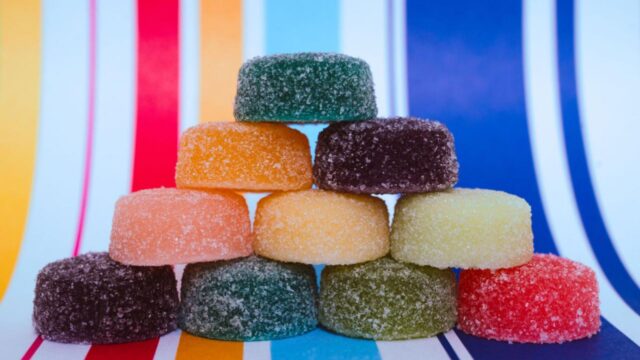
Edibles, such as cannabis-infused gummies, brownies, and other treats, have become increasingly popular as a way to consume cannabis. Unlike smoking or vaping, edibles like THC gummies offer a discreet and often more enjoyable method of experiencing the effects of cannabis. However, the way edibles affect the body is significantly different from other forms of cannabis consumption. Understanding what happens to your body when you eat edibles can help you make informed choices about using them.
The Basics of Edibles
Edibles are food products that have been infused with cannabis extracts, typically containing THC (tetrahydrocannabinol), CBD (cannabidiol), or both. THC is the psychoactive compound responsible for the “high” associated with cannabis, while CBD is non-psychoactive and is often used for its potential therapeutic effects.
When you consume an edible, the cannabis compounds must pass through your digestive system before entering your bloodstream. This process is slow and can lead to delayed onset of effects compared to smoking or vaping. However, the effects of edibles are often more potent and longer-lasting.
The Journey Through Your Digestive System
When you eat an edible, the process begins in your mouth, where digestion starts. The edible then travels down your esophagus and into your stomach, where it begins to be broken down by stomach acids and enzymes. Unlike smoking, where THC enters the bloodstream almost immediately through the lungs, the THC in edibles must be absorbed through the digestive tract, which takes more time.
After the edible is partially digested in the stomach, it moves to the small intestine. THC is absorbed into the bloodstream and transported to the liver. The liver plays a crucial role in how edibles affect your body. When THC reaches the liver, it is metabolized into a compound called 11-hydroxy-THC, which is much more potent than THC itself. This compound is then circulated throughout your body, leading to the effects commonly associated with edibles.
Delayed Onset of Effects
One of the most significant differences between edibles and other forms of cannabis consumption is the delayed onset of effects. When you smoke or vape cannabis, the effects are usually felt within minutes. However, with edibles, it can take 30 minutes to 2 hours or more for the impact to be felt. This delay is because the THC has to pass through the digestive system and be processed by the liver before it reaches your brain.
Many people who are new to edibles make the mistake of consuming more before the effects have fully kicked in, leading to an overdose. This can result in intense and uncomfortable experiences, including anxiety, paranoia, and even hallucinations. It’s essential to start with a low dose and be patient when consuming edibles.
The Intensity and Duration of Effects
Once the effects of an edible begin, they are usually much more intense than those experienced from smoking or vaping. This is partly due to the conversion of THC to 11-hydroxy-THC in the liver, which is more potent and has a longer half-life. The high from edibles can last anywhere from 4 to 12 hours, depending on the dose, the individual’s metabolism, and other factors.
The intensity of the effects can vary widely depending on the dosage, the individual’s tolerance, and even what they have eaten that day. Eating edibles on an empty stomach can lead to a quicker onset of effects while consuming them with food can slow the absorption and lead to a more gradual experience.
Psychological and Physical Effects
The effects of edibles are not limited to just a heightened sense of euphoria or relaxation. They can also have significant psychological and physical effects on the body.
- Psychological Effects: The most common psychological effects of edibles include altered perception of time, heightened sensory perception, and a feeling of euphoria. However, these effects can vary greatly depending on the individual and the dose. Higher doses can lead to more intense experiences, including anxiety, paranoia, and even temporary psychosis in some cases. This is why it’s essential to be mindful of the dosage and to start with a low amount if you are new to edibles.
- Physical Effects: Edibles can also cause a range of physical effects, including dry mouth, red eyes, increased heart rate, and, in some cases, dizziness or lightheadedness. Some people may also experience nausea, especially if they consume too much. On the positive side, edibles are often used to manage chronic pain, inflammation, and other physical ailments. The effects on the body can be soothing and therapeutic, especially for those using edibles for medical purposes.
Metabolism and Individual Differences
Everyone’s body reacts differently to edibles due to factors like metabolism, body weight, tolerance, and even genetic factors. Some people may feel the effects of edibles more quickly and intensely, while others may require a higher dose to achieve the same effects.
Metabolism plays a significant role in how your body processes edibles. People with faster metabolisms may feel the effects sooner and metabolize the THC more quickly, resulting in a shorter duration of effects. Conversely, those with slower metabolisms may experience a delayed onset of effects, but the effects may last longer.
Body weight and fat content also influence how your body processes edibles. THC is lipophilic, meaning it binds to fat molecules. Therefore, individuals with higher body fat may absorb and store THC more effectively, leading to prolonged effects.
The Risks of Overconsumption
One of the biggest risks associated with edibles is overconsumption. Because the effects take longer to set in, people may mistakenly consume more than they should, leading to an overwhelming and unpleasant experience. Overconsumption of edibles can result in severe anxiety, paranoia, hallucinations, and even vomiting.
Unlike smoking or vaping, where the effects can wear off relatively quickly, the effects of edibles can last for hours. If you find yourself in a situation where you’ve consumed too much, it’s important to stay calm and remember that the effects will eventually subside. Drinking water, eating light snacks, and finding a comfortable, quiet place to relax can help you manage the experience.
Conclusion
Edibles offer a unique and enjoyable way to experience the effects of cannabis, but they come with their own set of challenges. Understanding what happens to your body when you eat edibles can help you make informed decisions and avoid unpleasant experiences. By starting with a low dose, being patient, and paying attention to how your body reacts, you can safely enjoy the benefits of edibles while minimizing the risks.






